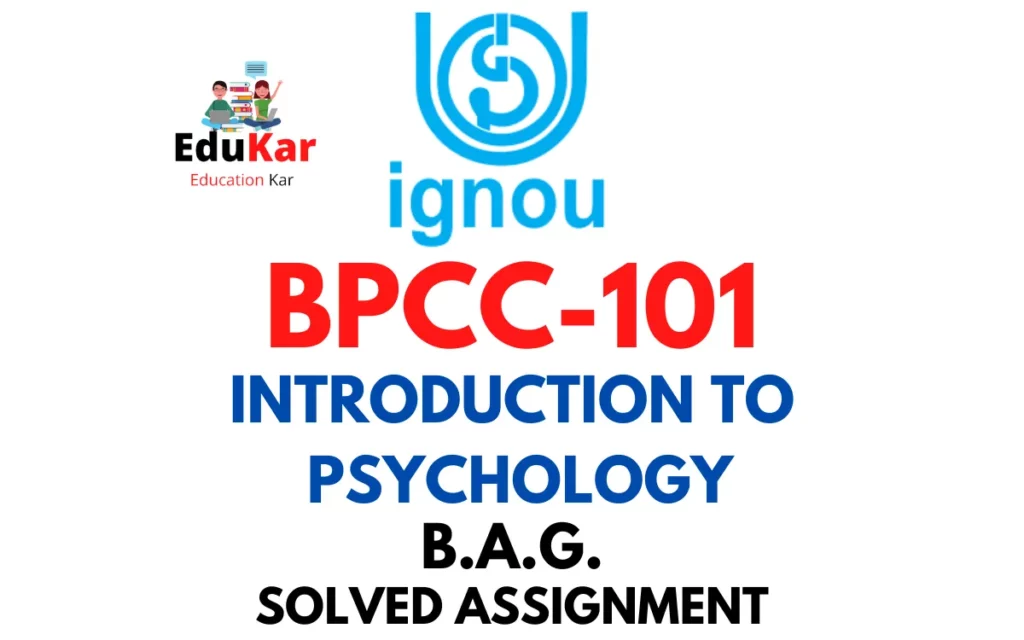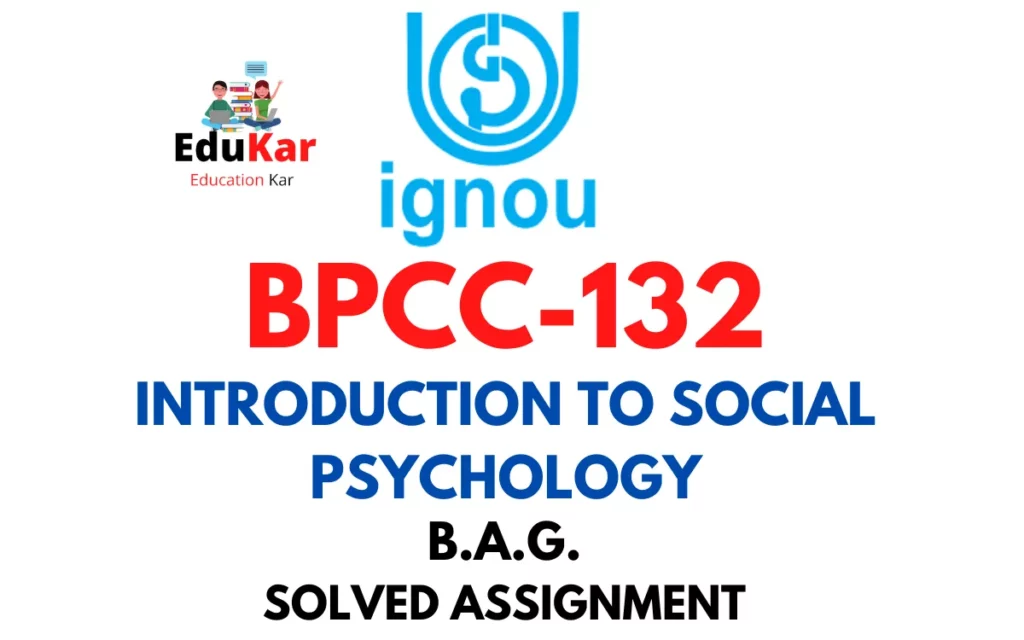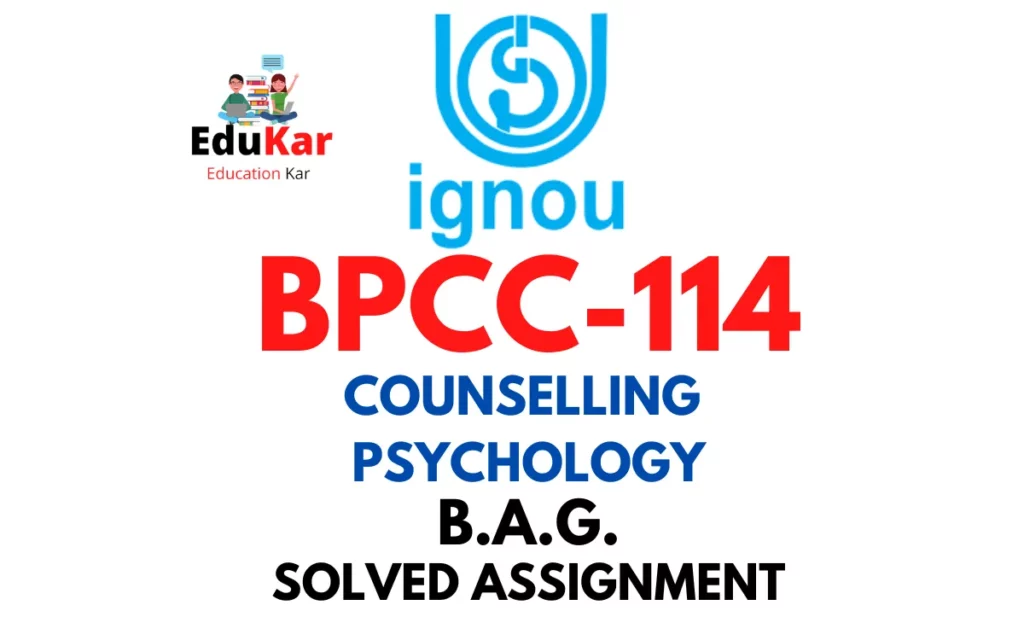Contents
- 1 Assignment 1
- 2 Answer the following questions in about 500 words each.
- 3 Assignment 2
- 4 Answer the following questions in about 100 words each.
- 4.1 4. Assessment of children with disability
- 4.2 5. Negative outcomes of substance use and dependence.
- 4.3 6. Lifespan development is multi-directional.
- 4.4 7. Bronfenbrenner’s ecological theory.
- 4.5 8. Psyoeducation
- 4.6 9. Child labour
- 4.7 10. Role of school psychologist in special education
- 4.8 11. Gilligan’s view on moral development
- 5 FAQs:
BPCS 184-SCHOOL PSYCHOLOGY (IGNOU-BAG) Solved Assignment 2022-2023: The assignment covers the course material for the subject BPCS 184, which is a crucial component of the BAG program. It is designed to help students gain a deeper understanding of the key concepts and theories in the field of psychology and its applications. The solved assignment provides a step-by-step approach to the course material, making it easy for students to follow and understand. It includes well-researched answers to the questions asked in the assignment, along with detailed explanations and examples. With its clear and concise format, the BPCS 184 Solved Assignment is an essential tool for students looking to excel in their studies and achieve their academic goals.
| Title | BPCS 184-SCHOOL PSYCHOLOGY (IGNOU-BAG) Solved Assignment 2022-2023 |
| University | IGNOU |
| Degree | Bachelor Degree Programme |
| Course Code | BPCS 184 |
| Course Name | SCHOOL PSYCHOLOGY |
| Total Marks | 100 |
| Year | 2023 |
| Language | English |
| Assignment Code | Asst /TMA /2022-23 |
| Last Date for Submission of Assignment: | For June Examination: 31st March For December Examination: 30th September |

Assignment 1
Answer the following questions in about 500 words each.
1. Define school psychology. Discuss the need and relevance of school psychology.
Ans: School psychology is a branch of psychology that focuses on the academic and emotional well-being of students in educational settings. School psychologists work with students, teachers, and families to address a range of issues that impact a student’s success in school. These issues can include learning difficulties, behavioral problems, and emotional distress.
The need for school psychology has increased in recent years as the educational system has become more complex and demanding. Students today face a wide range of stressors, including academic pressures, bullying, and mental health concerns. As a result, many students are struggling to succeed in school and are in need of support and intervention.
The relevance of school psychology lies in its ability to provide students with the support they need to overcome the challenges they face in school. School psychologists work with students to identify and address the root causes of their difficulties, whether they are related to academic performance, behavior, or mental health. By doing so, school psychologists can help students to build the skills and resilience they need to overcome these challenges and succeed in school.
In addition to working directly with students, school psychologists also play an important role in helping teachers and families to understand and support students. They can provide teachers with guidance on how to create a supportive learning environment, and they can work with families to provide support and resources to help students succeed at home.
School psychologists are trained in a range of evidence-based interventions and strategies that have been shown to be effective in improving student outcomes. These strategies include individual and group counseling, behavior management techniques, and academic interventions. School psychologists also use a variety of assessment tools to identify students’ strengths and weaknesses, and to determine the best course of action to support their academic and emotional well-being.
School psychology plays a crucial role in the education system, providing students with the support they need to overcome the challenges they face in school and succeed in their academic and personal lives. By working with students, teachers, and families, school psychologists can help to create a supportive and inclusive learning environment that enables all students to thrive.
2. Explain internalizing behavioural problems in children.
Ans: Internalizing behavioral problems in children refer to patterns of negative thoughts, feelings, and behaviors that are directed inward and impact mental health and well-being. These problems can manifest in various forms, such as anxiety, depression, and withdrawn or introverted behavior.
Anxiety is a common internalizing behavioral problem in children, which can lead to feelings of fear and worry. Children may experience difficulty in social situations, experience separation anxiety or panic attacks, or avoid activities that trigger their anxiety. Depression is another common internalizing behavioral problem that can lead to feelings of sadness, hopelessness, and a lack of energy or motivation. Children with depression may withdraw from friends and activities they once enjoyed, and may have difficulty sleeping or eating.
Internalizing behavioral problems can also manifest as withdrawn or introverted behavior, where children may become isolated and avoid social interaction. This behavior can result from a lack of self-esteem, negative thoughts, or anxiety, and can lead to difficulties in forming relationships and a lack of social support.
The cause of internalizing behavioral problems in children is complex and can involve a combination of genetic, environmental, and psychological factors. Children who have experienced traumatic events or abuse, have a family history of mental health problems, or have been exposed to stress and conflict may be more likely to develop internalizing behavioral problems.
Treatment for internalizing behavioral problems in children typically involves a combination of psychotherapy, medication, and family support. Cognitive-behavioral therapy (CBT) is a commonly used form of psychotherapy that can help children identify negative thought patterns and replace them with positive ones. Medication, such as antidepressants, may also be prescribed to help manage symptoms of anxiety or depression. Family support and involvement in treatment can also be beneficial, as parents and caregivers can provide a supportive environment and help children implement coping strategies in their daily lives.
It is important for parents and caregivers to recognize the signs of internalizing behavioral problems in children and seek help as early as possible. By seeking appropriate treatment and support, children can learn to manage their symptoms and lead a fulfilling and happy life.
Internalizing behavioral problems in children refer to patterns of negative thoughts, feelings, and behaviors that impact mental health and well-being. These problems can manifest in various forms and are caused by a combination of genetic, environmental, and psychological factors. Treatment typically involves a combination of psychotherapy, medication, and family support, and early intervention is crucial in helping children manage their symptoms and lead a fulfilling life.
3. Discuss play therapy as an intervention for emotional and behavioural problems in children.
Ans: Play therapy is a type of psychotherapy that uses play and play activities as the primary mode of communication with children. It is an effective intervention for children who are experiencing emotional and behavioral problems, and is particularly useful for children who have difficulty expressing their feelings and thoughts through verbal communication. Play therapy can help children to cope with a variety of emotional and behavioral difficulties, including anxiety, depression, anger, and trauma.
Play therapy is based on the belief that play is a natural form of expression and communication for children, and that it provides a safe and non-threatening environment in which they can express their feelings and thoughts. During play therapy, children are given the opportunity to play with a variety of toys and materials, and the therapist uses their play to understand and address their emotional and behavioral difficulties.
The therapeutic process of play therapy involves the use of a variety of play materials, such as dolls, stuffed animals, and games, to create a safe and nurturing environment for the child. The therapist will encourage the child to express their feelings and thoughts through their play, and will help them to understand and process their emotions. The therapist may also use a variety of techniques, such as storytelling and role-playing, to help the child work through their difficulties and to develop new coping skills.
One of the key benefits of play therapy is that it provides children with a safe and supportive environment in which they can express their feelings and thoughts without fear of judgment or rejection. This helps children to develop a sense of trust and safety with the therapist, which is essential for successful therapy. Additionally, play therapy is a non-threatening and non-invasive form of therapy that can help children to feel more comfortable and relaxed, which can lead to greater therapeutic progress.
Play therapy is also an effective intervention for a wide range of emotional and behavioral problems in children. For example, it has been found to be effective in treating children with anxiety, depression, and post-traumatic stress disorder. In addition, play therapy can help children to develop important social and emotional skills, such as empathy, communication, and problem-solving.
Play therapy is a valuable intervention for children who are experiencing emotional and behavioral difficulties. It provides a safe and supportive environment in which children can express their feelings and thoughts, and it is an effective means of addressing a wide range of emotional and behavioral problems in children. By working with a qualified play therapist, children can gain a better understanding of their emotions and develop the skills they need to cope with their difficulties and lead happy and healthy lives.
Assignment 2
Answer the following questions in about 100 words each.
4. Assessment of children with disability
Ans: Assessment of children with disabilities is a crucial step in identifying their strengths and needs, and in developing appropriate interventions and support. This assessment typically involves evaluating a child’s developmental, cognitive, and academic skills, as well as their behavior, communication, and physical abilities. A variety of assessment tools, including standardized tests, observations, and interviews with parents and teachers, may be used to gather information. It is important for assessments to be conducted in a culturally sensitive and inclusive manner and to involve a multidisciplinary team of professionals, including psychologists, educators, and medical specialists. The results of the assessment can inform the development of individualized education plans (IEPs) and help ensure that children with disabilities receive the support they need to reach their full potential.
5. Negative outcomes of substance use and dependence.
Ans: Substance use and dependence can lead to a range of negative outcomes, both physically and psychologically. Chronic use of drugs and alcohol can lead to a range of health problems, including liver and heart damage, respiratory issues, and increased risk of infections and chronic diseases. Substance abuse can also negatively impact mental health, leading to depression, anxiety, and other mental health disorders. Substance dependence can also have a profound impact on personal relationships, causing conflict and strained relationships with friends and family members. Additionally, substance use and dependence can lead to financial problems and loss of employment, and can have serious legal consequences, including arrest and imprisonment.
6. Lifespan development is multi-directional.
Ans: Lifespan development refers to the changes that occur in individuals from conception to death. It is a complex and dynamic process that is influenced by a range of internal and external factors, including genetics, environment, and life experiences. The study of lifespan development recognizes that development is multi-directional, meaning that it can occur in multiple directions and at different rates. For example, some individuals may experience physical decline as they age, while others may experience an increase in wisdom and emotional well-being. Additionally, development can occur in a circular or cyclical pattern, with changes in one aspect of development influencing changes in other areas. Overall, the multi-directional nature of lifespan development highlights the importance of considering the complex and interconnected nature of human development.
7. Bronfenbrenner’s ecological theory.
Ans: Bronfenbrenner’s ecological theory is a developmental model that provides a framework for understanding how a child’s development is influenced by different systems and levels of the environment. The theory identifies five systems of influence on a child’s development: microsystem, mesosystem, exosystem, macrosystem, and chronosystem. The microsystem refers to the child’s immediate surroundings, such as family and school, while the mesosystem refers to the relationships and interactions between these systems. The exosystem refers to broader systems that affect the child indirectly, such as the workplace or government policies. The macrosystem represents cultural values and beliefs, and the chronosystem refers to the dynamic interaction of these systems over time. Bronfenbrenner’s ecological theory highlights the importance of considering the complex interplay of environmental factors in understanding a child’s development and well-being.
8. Psyoeducation
Ans: Psychoeducation is the process of educating individuals about mental health and psychological disorders. This may include providing information about the causes, symptoms, and treatment options for specific disorders, as well as helping individuals understand their own emotions, behaviors, and thought patterns. Psychoeducation can be delivered in a variety of formats, including group therapy, workshops, and self-help materials. The goal of psychoeducation is to increase understanding, reduce stigma, and empower individuals to manage their mental health and seek appropriate treatment. Psychoeducation is often used as a component of psychotherapy and can be an effective way to enhance treatment outcomes for a range of mental health conditions.
9. Child labour
Ans: Child labor means the employment of children in work that is hazardous or detrimental to their health, education, or overall well-being. It is a widespread problem, affecting millions of children around the world, particularly in developing countries. Child labor violates children’s rights, including their right to education, play, and protection from abuse and exploitation. Children who are engaged in child labor are often subject to long working hours, low wages, and hazardous working conditions, which can have a lasting impact on their physical and mental health. In addition to the harm it causes to individual children, child labor also perpetuates poverty and perpetuates cycles of economic inequality from generation to generation. The international community has committed to ending child labor through the ILO’s Minimum Age Convention and the UN’s Convention on the Rights of the Child.
10. Role of school psychologist in special education
Ans: School psychologists play a crucial role in the field of special education. They are responsible for conducting assessments to determine the needs of students with disabilities, and for developing and implementing individualized educational plans (IEPs) that support their academic and behavioral growth. School psychologists work closely with teachers, parents, and other professionals to provide a comprehensive and coordinated approach to support students with special needs. They also provide individual and group therapy to help students manage emotional and behavioral problems, and offer counseling and support to families. Additionally, school psychologists are involved in the development and implementation of programs to promote positive school climates and address issues such as bullying, violence, and substance abuse. Through these efforts, school psychologists help to ensure that students with disabilities receive the support they need to succeed academically, socially, and emotionally.
11. Gilligan’s view on moral development
Ans: Gilligan’s view on moral development is based on her belief that women and men have different moral orientations. Gilligan argues that women have a “care orientation” that is centered on relationships, compassion, and interdependence, while men have a “justice orientation” that is focused on rights, justice, and individual autonomy. According to Gilligan, traditional theories of moral development, such as Kohlberg’s stages of moral development, are based on a male-oriented justice perspective and do not adequately reflect the moral reasoning of women. Gilligan’s work has been influential in expanding our understanding of gender differences in moral development and has helped to challenge traditional views of morality that prioritize justice over care. Her work has also been credited with helping to increase recognition of the importance of including a gender perspective in research on moral development.
FAQs:
How to Download BPCS 184-SCHOOL PSYCHOLOGY (IGNOU-BAG) Solved Assignment?
You can download it from the www.edukar.in, they have a big database for all the IGNOU solved assignments.
Is the BPCS 184-SCHOOL PSYCHOLOGY (IGNOU-BAG) Solved Assignment Free?
Yes this is absolutely free to download the solved assignment from www.edukar.in
What is the last submission date for (IGNOU-BAG) Solved Assignment?
For June Examination: 31st March, For December Examination: 30th September







![[Solved Assignment] BPCS 188-APPLICATIONS OF SOCIAL PSYCHOLOGY (IGNOU-BAG) 2022-2023 BPCS 188-APPLICATIONS OF SOCIAL PSYCHOLOGY IGNOU BAG Solved Assignment 2022-2023](https://edukar.in/wp-content/uploads/2023/01/BPCS-188-APPLICATIONS-OF-SOCIAL-PSYCHOLOGY-IGNOU-BAG-Solved-Assignment-2022-2023-1024x640.webp)








